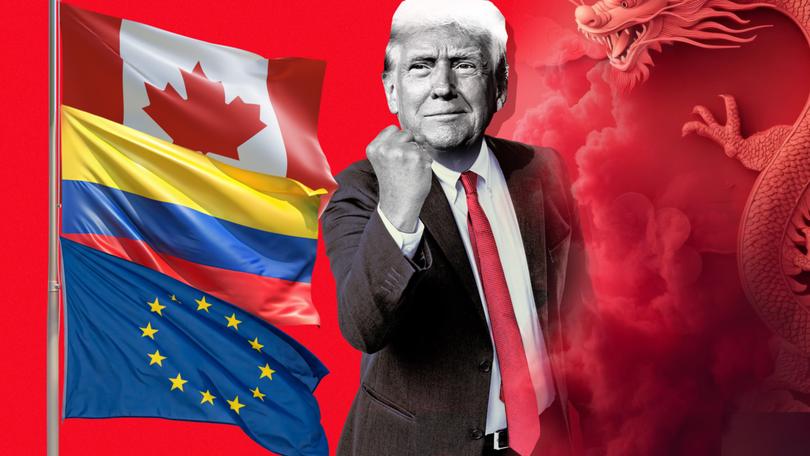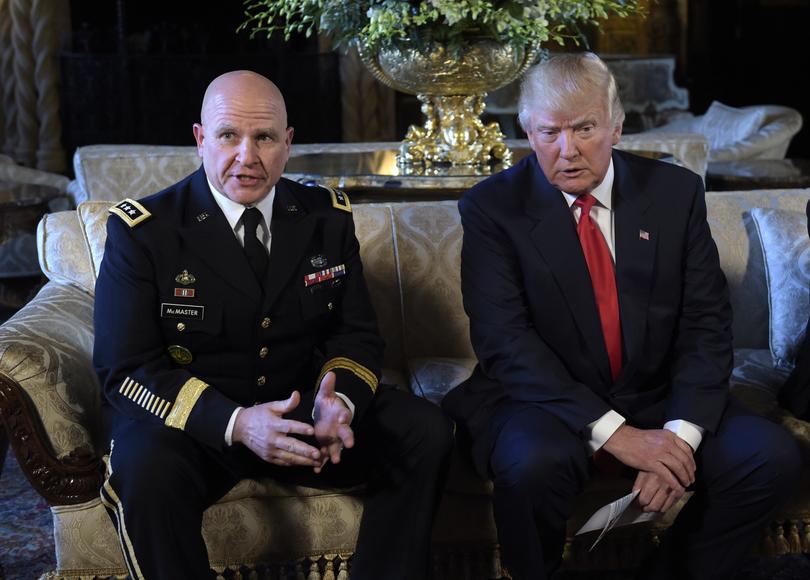LATIKA M BOURKE: Trump is the disruptor-in-chief. But could he disrupt his own US agenda against China?
LATIKA M BOURKE: The US President’s former national security adviser has raised concerns that the Trump Administration’s aggressive foreign policy with allies could eventually sabotage itself against China.

Donald Trump’s former national security adviser HR McMaster says he is concerned that the Trump Administration’s aggressive foreign policy with allies and partners could sabotage the US President’s goals to preserve American strength over China.
And he urged allied leaders to “help” President Trump “understand better” the way his messages that made for good political rallies at home were received differently abroad.
Since regaining office, President Trump has successfully used threats of tariffs against friendly countries Canada, Mexico and Colombia to extract concessions on curbing the flows of illegal drugs and migrants into the US.
Sign up to The Nightly's newsletters.
Get the first look at the digital newspaper, curated daily stories and breaking headlines delivered to your inbox.
By continuing you agree to our Terms and Privacy Policy.He has threatened to take over Greenland and annex Canada, and slapped countries, including Australia, which has a trade deficit with the US, with tariffs on steel in a bid to protect US jobs.
This week, the Trump Administration turned its fire on NATO allies in Europe, who the US has long encouraged to spend more on defence spending, saying the continent could no longer rely on America’s protection.
Vice-President JD Vance told the Munich Security Forum that the greatest threat to Europe was “from within”, citing European regulations on digital speech and tech platforms as well as migration levels as a greater danger than that posed by Russia and China. The showstopping speech has prompted comparison’s to Beijing’s aborted Wolf Warrior diplomacy. Afterwards, he met with Alice Weidel, the far-right leader of the Alternative for Deutschland political party that many Germans see as the heir of the Nazi party, just days out from that country’s national election.
Asked by The Nightly if he was concerned that the Trump Administration’s economic bullying and Wolf Warrior diplomacy tactics might harm the United States’ efforts to counter China, HR McMaster, who was the second of President Trump’s four national security advisers during his first term, was emphatic in his reply: “Yes.”
“It’s a worry, not because of the substance of the policies a lot of the times, but because of the statements that are made,” he said during an appearance at the Westminster think tank Policy Exchange.
The retired lieutenant general warned that the world was far more dangerous than when Mr Trump left office because of the “Axis of Aggressors” combining Russia, China, North Korea and Iran that were “aiding and abetting” each other’s agendas.
He said Mr Trump’s greatest strength also had the potential to be his ultimate weakness.
“I write a lot about this in my book – President Trump is disruptive – I think we can all agree on that,” he said, referring to his book, At War With Ourselves: My Tour of Duty in the Trump White House.
“There’s a lot in Washington, maybe in the world that needs to be disrupted.
“But what you hope for with President Trump is that he’s not so disruptive that he disrupts his own agenda and becomes the antagonist in his own story.

Describing the President as “a real estate development guy at heart”, Mr McMaster said while Mr Trump was very good at political rallies in the US where he could whip up popular sentiment about what needed to change in Washington, it was a different matter when it came to dealing with fellow leaders.
“Often times he’s not attuned to how what he says will be received by international audiences,” he said.
“So, I think that’s what he really needs from his counterparts, right?
“President Trump does learn, he does listen and he learns conversationally.”
He said the phone calls and visits by leaders would be very important.
“I am not in despair, after Munich, like some people are in despair,” he said.
“I’m certainly not going to cry or anything.
“But I think it’s important to engage President Trump, have these conversations with him and help him understand better how what he says is received abroad, rather than at a political rally in Ohio.”
Mr McMaster said while Europe should accept Mr Vance’s criticisms, he said the vice-president’s claim that the greatest threat to Europe was from within was a missed opportunity to highlight the threats Russia and China posed.
He predicted that the work the Biden Administration had done on pushing back against Chinese dominance of critical supply lines and over crucial industries would continue in the Trump Administration.
In the Indo-Pacific, the Administration placed the Quad and AUKUS high on its priority list, but has taken a far more aggressive approach with one of the world’s biggest markets – the European Union.
The US has long attempted to build alliances and partnerships in order to help counter China and lobbied Europe to have governments rip Huawei equipment from their 5G networks.
In any conflict with the Chinese, the US would be likely to seek allied help in sanctioning China, which would cause economic disruption greater than that experienced during the COVID pandemic or the war in Ukraine.
The European Commission worked closely with the US to impose tariffs on state-subsidised Chinese-made electric vehicles but faced major opposition from Germany and the nation’s carmakers, who have factories in China.
China’s Foreign Minister Wang Yi, who spoke after the US vice-president at the Munich Security Conference, said the world was in an “increasing mix of turbulence and transformation” that would lead to multipolarisation.
“Will multipolarity bring chaos, conflict and confrontation?” Mr Wang asked.
“Does it mean domination by major countries and the strong bullying the weak?
“China will surely be a factor of certainty in this multipolar system, and strive to be a steadfast constructive force in a changing world.”
Former Republican governor Jon Huntsman, CEO of Mastercard and a former US ambassador to China and Russia, said that the Vance speech was one of reassurance.
“(China) is a smart country that thrives on a world of ambiguity,” he told an event hosted by the Delhi-based Observer Research Foundation in Munich.
“And they do so because there is zero ambiguity in their national strategy, they know exactly where they’re going.
“And they task and implement and execute with precision, so a world of ambiguity plays to their strengths.”
Lana Nusseibeh, the UAE’s assistant minister for political affairs, said countries would be taking a second look at China given the toll the wars in Ukraine and the Middle East were taking on economies.
“If you were to take a snapshot of (the day of Wang Yi’s speech) and forget about the months and years before, all of the sudden China kinda comes across as Europe’s best friend,” she said.
“I’m not saying that we’re going to forget those months and years before but because of this growing transatlantic rift, there’s going to be greater openness, provided that China plays well the game.
“And I think it is playing well the game, to actually look for ways of working with China.”
Following Mr Vance’s speech, former Conservative UK prime minister John Major told the BBC that the Trump Administration was creating a global power vacuum that would be filled by Russia and China.
“If America behaves in this fashion and retreats towards isolation, she leaves the door open to China and Russia to supplement her place in the world,” Sir John said.
“And the free world, I believe, now fears that America, with all her great power and prestige and all that she has done to keep the world safe in recent years, may now be turning her back on the international responsibilities she has previously taken.
“And if she does do there’s no other nation state that can replace them other than China and that is not something I think the West should certainly wish to see.”

